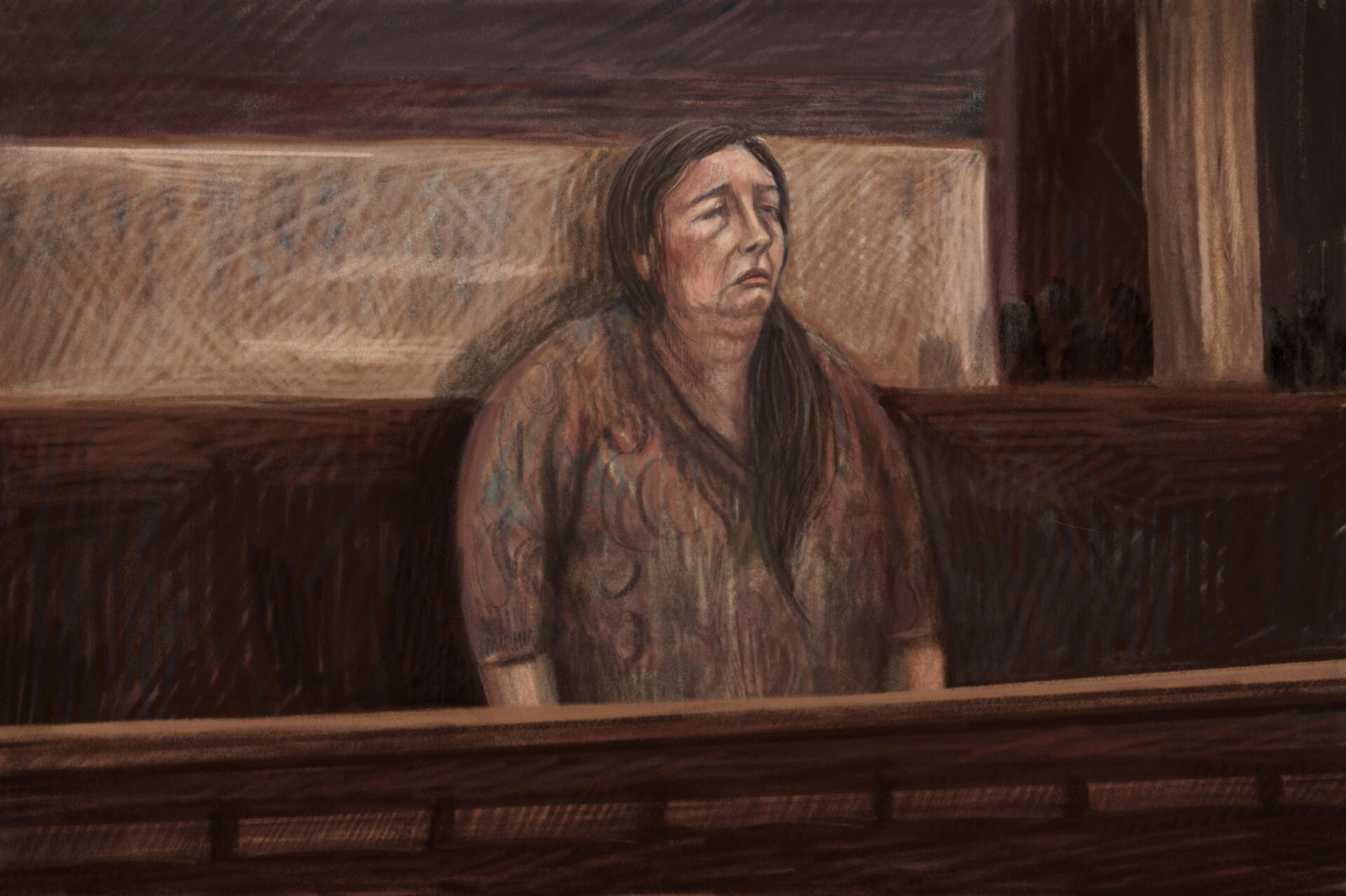Prosecutors say Erin Patterson had intent to kill months before mushroom lunch — as it happened
The prosecution and the defence have made submissions about what sentence convicted triple-murderer Erin Patterson should receive as part of her plea hearing.
The hearing at the Supreme Court of Victoria was also an opportunity for victims and their loved ones to provide statements on how the deaths of Don and Gail Patterson and Heather Wilkinson affected them.
Look back at the day's developments in the blog.
Key Events
Live updates
Catch up on all the day's events
Thanks for joining us for our live coverage of Erin Patterson's plea hearing.
If you missed anything from today's proceedings at the Supreme Court, catch up with Kristian Silva's comprehensive wrap here:
Court adjourns for the day
Justice Beale adjourns the court, and will spend the next fortnight to decide on the sentence for triple-murderer Erin Patterson.
During today's plea hearing, Justice Beale told the court that Patterson's crimes were egregious, and that it had been conceded that her actions relating to the deadly beef Wellington lunch constituted "worst category offending".
However, Justice Beale also expressed concerns for Patterson's current living conditions in the isolated Gordon Unit of the Dame Phyllis Frost Centre, saying her current arrangements did not sound "humane".
He will take all of these factors into account when deciding on a sentence for Erin Patterson.
In Victoria, the maximum jail sentence for murder is life imprisonment (25 years), with a minimum non-parole period of 30 years.
Patterson will have 28 days from the date of her sentence to begin the process of lodging an appeal, according to the Supreme Court of Victoria.
VIDEO: Erin Patterson arrives at court
Here's footage taken earlier today of Erin Patterson as she entered the Supreme Court of Victoria before her plea hearing began.
Loading...Sentence to be handed down on September 8
Justice Beale tells the court he would like to hand down his sentence within a fortnight.
He earmarks 9.30am on the 8th of September as a potential time and date, and both the prosecution and defence say this is acceptable.
Justice Beale says although he would like to hand down the sentence in Morwell, maintenance issues prevent it and the sentence will be given at the Supreme Court of Victoria in Melbourne's CBD instead.
With that, Erin Patterson is led out of the courtroom.
Justice Beale to judge Patterson's prison future
The prosecution addresses Patterson's current condition in the Gordon Unit of the Dame Phyllis Frost Centre, which Justice Beale says "doesn't sound very humane".
Jane Warren concedes the conditions are clearly relevant.
Justice Beale says he will have to determine what Patterson's future looks like.
Justice Beale says he is fairly confident she would remain in isolation in prison for a very long time due to her media presence.
"Her notoriety isn't going to diminish," he says.
"Well one day it will. Her notoriety won't but [public interest will]," Ms Warren says.
She says if you asked the average 20-year-old who Port Arthur mass murderer Martin Bryant is, they would not know.
Ms Warren says eventually Patterson's infamy will decline.
"Can you put an estimate on how long that will be?" Justice Beale asks.
"No," Ms Warren concedes.
Justice Beale says he is fairly confident she will remain in isolated in prison for a very long time.
Prosecution dubs autism diagnosis as 'hearsay'
The prosecution takes issue with the defence's claim that Patterson has autism spectrum disorder, saying any evidence of it is simply "hearsay" from other family members said in passing.
"The evidence just isn't there," Ms Warren says.
"She doesn't have a lot of credibility ... you're pushing on an open door," Justice Beale says.
Patterson's murders are 'worst category offending', prosecution says
Jane Warren submits to the court that if Patterson had mentioned cooking with wild mushrooms, it could have changed the trajectory of Don, Gail, Heather and Ian's treatment.
She says Patterson made "zero" effort to do so.
Finally, Ms Warren says the "elaborate" various steps Patterson made to cover up her crime, including disposing of evidence and lying to authorities, indicate a "complete absence of regret or remorse".
"There's been no remorse shown," Ms Warren says.
"No, she maintains her innocence," Justice Beale says.
She says Patterson's actions should be considered "worst category offending".
Justice Beale says this point has been conceded.
He tells the court he read all of the 28 victim impact statements over the weekend, and noted how the crimes had affected four generations of a family.
Prosecution argues poison serves as an aggravating feature
Jane Warren argues the use of poison is an aggravating factor, as it leads to a long and agonising death for the victims.
Justice Beale raises the point that there may be poisons that do not cause painful or long deaths.
Ms Warren says given her familiarity with mushrooms, she must have known of the effects.
"It seems she had a level of knowledge about death cap mushrooms prior, having sourced them as she did," Ms Warren says.
Ms Warren argues Patterson sat on crucial information for hours and days that could have prevented the victims' experiencing pain from death cap mushrooms.
What are mitigating factors?
As we heard earlier from Colin Mandy SC, who argued that prison would be significantly more impactful for Erin Patterson, there are also mitigating factors when considering a sentence.
These factors could be:
- The age of the offender
- The background of the offender
- The previous good character of the offender
- The effect of prison on the offender
What are aggravating factors?
Much of the prosecution's argument has dealt with aggravating factors, with Jane Warren claiming the murders featured the "utmost level" of planning.
As a refresher, we can take a look at guides provided by the Sentencing Advisory Council, which lists the following factors which might aggravate a convicted person's sentence
- Pre-planning the crime (premeditation)
- Committing the crime as part of a group against an outnumbered victim
- Use of a weapon, including a pretend weapon
- A breach of trust by the offender towards the victim
Erin Patterson intended to kill all guests, prosecution argues
The prosecutions says it is clear that by July 16, there was a clear indication to harm all of her lunch guests, not just her estranged husband Simon.
Jane Warren says if she only intended to poison Simon, she would have only prepared one beef Wellington, but instead made five.
The prosecution argues that Patterson clearly intended to lure her guests to her home with her messages.
Prosecution argues about Patterson's pre-meditated intent
Prosecutor Jane Warren and Justice Christopher Beale recap much of the evidence we heard over the weeks-long murder trial, including mobile phone data, the dehydrator and death cap mushroom locations.
The prosecution argues about the significance of Patterson buying a dehydrator so soon after possible visits to Loch and Outtrim, where death cap mushrooms were seen growing.
Ms Warren also notes the April 2023 photographs found on Patterson's devices of dehydrated mushrooms consistent with death caps.
She argues that this shows a pre-meditated intent to kill someone as early as April.
Ms Warren says the Crown does not go as far as to say she had decided to kill the lunch guests at this point, and argues she decided on this later.
Prosecution asks for maximum sentence over murder
The prosecution begins its argument for Erin Patterson's sentence.
The Crown submits that the court should impose the maximum penalty for the murder charges.
However, it does not make the same argument with regards to the attempted murder charge.
More from the defence
Colin Mandy now turns his attention to the crime itself, the poisoning of beef Wellingtons by Erin Patterson.
He concedes to the court that the jury found this action was deliberate.
However, Mr Mandy argues that some other aspects argued by the Crown, such as that Simon Patterson was intended to be a guest at the deadly lunch, are still speculative.
He then turns to the toxins used, and addresses how the suffering caused by the poison may be an aggravating factor in sentencing.
But he refutes the Crown's argument that all poisons cause suffering and that his client must have known that, saying it is untrue as a matter of fact.
Mr Mandy says the defence nonetheless requests a non-parole period be enforced.
Today's court sketch
Media has once again descended upon the Erin Patterson trial, today at the Supreme Court of Victoria in Melbourne's CBD.
It has been an emotional day for the convicted triple-murderer, as she fought back tears during the victim impact statement given by Ian Wilkinson.
Here is a court sketch of Patterson as she stood in the courtroom.

Erin Patterson's autism spectrum disorder raised
Justice Beale asks Mr Mandy about Patterson's diagnosis with autism spectrum disorder.
Mr Mandy makes reference to depositions from Simon Patterson and Child Protective Services that detail various references to Patterson having autism spectrum disorder, ADHD and anxiety.
Mr Mandy says these conditions mean Patterson finds imprisonment especially difficult, with his client unable to adapt to changes in routine.
Justice Beale tells Mr Mandy that it doesn't sound like there is much variation to Patterson's routine currently in the Gordon Unit.
Mr Mandy tells Justice Beale that things change on a "minute-by-minute" basis in the unit, including other "mentally ill" inmates causing disruption in the cells next door.
Defence gives argument for Erin Patterson's sentence
The defence begins its plea.
Colin Mandy mentions that Erin Patterson could face a minimum non-parole period of 30 years, which would mean Patterson would be 80 before being eligible for parole.
Mr Mandy tells the court that the conditions in which Erin Patterson is being kept should influence the sentence she is given.
The defence argues Patterson will always be at risk from other prisoners.
He says it means his client will likely be kept in her current conditions for the forseeable future, if not for her entire sentence.
Mr Mandy says the tough conditions mean the burden of imprisonment will be much heavier for Patterson.
The other long-term inmates of the Gordon Unit
Colin Mandy concludes his questioning, and prosecutor Jane Warren has one more question to ask of Jennifer Hosking.
Ms Warren asks about the other long-term prisoners in the Gordon Unit.
In the case of the other prisoners, Ms Hosking said there were serious safety concerns which required the prisoners to be isolated long-term, including violent attacks against other prisoners.
Will Erin Patterson ever be allowed to mix with other prisoners?
Jennifer Hosking tells the court that Erin Patterson's placement in the Gordon Unit is dependent on a range of factors.
"While Ms Patterson remains notorious, there would be a risk to placing her [in the Murray Unit]?" Colin Mandy asks.
Ms Hosking says she would never say that Patterson will stay where she is for her entire sentence, and that it remained an ongoing, "flexible" assessment of her risk.
Mr Mandy disagrees that the arrangement is "flexible". He asks whether Ms Hosking can definitively say whether Patterson will ever leave the isolated Gordon Unit.
She says she cannot say that.
Defence raises Erin Patterson's limited library access
Colin Mandy asks Jennifer Hosking about Patterson's library access.
"Every single Friday she has said she wants access to the library," Mr Mandy says.
"She only has access to the library if no one else is using it, with the result she's had access to the library a handful of times since she's been in the Gordon Unit."
Ms Hosking agrees.
Mr Mandy says his client has to be accompanied by two staff members, and only "has 20 minutes there".
He says Patterson has similarly been unable to access the lounge area or exercise equipment, due to either staff issues or other prisoners using the equipment.

